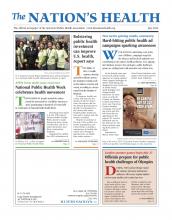Though they cost very little, recommended medical services are not being received by most older Americans, according to a national survey.
The survey, released in April by the John A. Hartford Foundation, found that only 7 percent of older Americans are receiving all seven of the low-cost, low-tech, medical services recommended for their age group, even though the services can reduce the risk of many preventable health problems, increase their quality of life and slash health care costs.
The inexpensive services — all of which are considered critical to standard geriatric assessments — include an annual medication review, falls risk assessment and history, depression screening, referral to community-based health resources and a discussion of the senior’s ability to perform routine daily tasks and activities without help.
The survey of more than 1,000 Americans ages 65 and older found that 52 percent of respondents reported receiving none or only one of the seven recommended services, and 76 percent received fewer than half. And even though Medicare has offered free annual wellness visits to beneficiaries since January 2011, a high number of survey respondents — 68 percent — had never heard of the benefit. Only 17 percent of respondents reported receiving annual wellness visits, which pay doctors nearly three times as much as an average office visit, according to a statement released with the survey results,
“We feel this survey highlights why expert geriatric care is needed,” said Christopher Langston, PhD, program director for the John A. Hartford Foundation, which commissioned the poll. “One of the central truths of geriatrics is that older adults are not just older 40-year-olds any more than children are just small 40-year-olds. Older people need different care, and when they don’t receive these kinds of evidence-based interventions, as many don’t, the result is a lot of preventable disability and suffering.”
Reflecting their concerns about future health woes, 93 percent of respondents expressed strong support for requiring all medical and nursing students to take classes and other training in the area of caring for older people, which most are not presently required to do, according to the survey. For example, 67 percent of respondents said they believed they would “get better care” if their doctors, nurses, social workers and other health professionals had more geriatrics training.
Among other findings, 62 percent of survey respondents had not received depression screenings, even though depression can worsen other chronic conditions and increase the cost of care. Equally troubling, 75 percent of adults ages 80 and older said their doctor had not discussed how to avoid falling, which is another highly preventable problem with serious consequences for older adults. Among adults 65 and older, falls are the leading cause of death from injury, according to the Centers for Disease Control and Prevention.
Conducted between Feb. 29 and March 3, the survey, “How Does it Feel? The Older Adult Health Care Experience,” focused on Americans ages 65 and older and assessed whether patients received the seven important medical services to support healthy aging in the past 12 months.
“Preserving people’s ability to do the things that are important to them is the gold standard of geriatric care,” Rosanne Leipzig, MD, PhD, a professor of geriatrics and palliative medicine at the Mount Sinai School of Medicine, said in a statement. “Helping people learn how to avoid falling, screening for depression, and closely tracking their medications can affect older patients’ quality of life just as much as any test we order or prescription we write.”
For more information or to download the survey results, visit www.jhartfound.org/news-events/publications.
- Copyright The Nation’s Health, American Public Health Association









